Who goes to German Pegida 'anti-Islamisation' rallies?
- Published
Patriotic Europeans against the Islamisation of the West (Pegida) have held weekly protests since October
Every Monday since October big "anti-Islamisation" rallies have been staged in Dresden, eastern Germany, by a new grassroots organisation Pegida.
The numbers attending have grown, but so have counter-demonstrations by Germans alarmed by what they see as Islamophobia and who want to defend tolerance and diversity.
The terror attack on Charlie Hebdo magazine in Paris may boost support for Pegida, amid fear and anger over Islamist violence.

What is Pegida?
It stands for "Patriotic Europeans Against the Islamisation of the West" (in German: Patriotische Europaer Gegen die Islamisierung des Abendlandes).
Pegida supporters say people need to "wake up" to the threat from Islamist extremists. They want Germany to curb immigration, accusing the authorities of failing to enforce existing laws.
A record 25,000 attended the Pegida march in Dresden on 12 January.
Yet Dresden has far fewer immigrants than many other German cities.
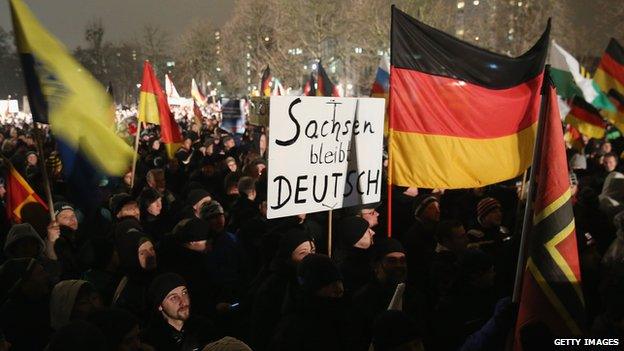
Pegida march in Dresden: The slogan says "Saxony remains German"
Among the slogans at the rallies is "wir sind das Volk" (we are the people) - a deliberate echo of the anti-communist citizens' marches in former East Germany in 1989.
Pegida says it is defending "Judeo-Christian" values and its 19-point manifesto, external avoids racist language. It is against "preachers of hate, regardless of what religion" and against "radicalism, whether religiously or politically motivated".
It is against "anti-women political ideology that emphasises violence" but "not against integrated Muslims living here".
It challenges what it sees as liberal political correctness and multiculturalism in Germany - the values that dominated West German politics after World War Two.

How did it begin?
It was launched as a Facebook group by Lutz Bachmann, 41, a chef-turned-graphic designer who insists that he is not racist. He has admitted to past criminal convictions, including for drug-dealing, and has spent time in jail.
The numbers swelled through social media, and soon the group attracted right-wing followers from some established political parties.
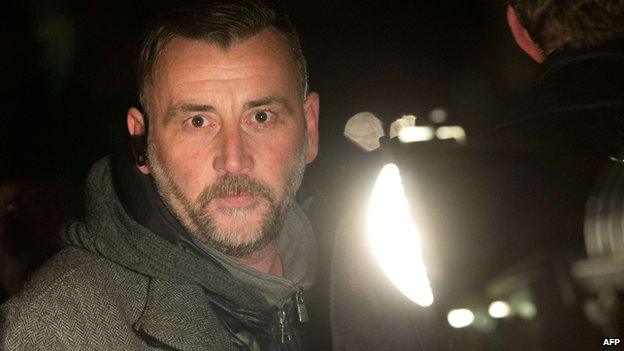
Lutz Bachmann says his past crimes have no relevance to Pegida

Who supports Pegida?
It has attracted a variety of right-wing and far-right groups, as well as ordinary citizens who worry about conservative Islam and its impact on German society. Supporters are generally fed up with establishment politicians.
Some neo-Nazi groups have praised Pegida. At the rallies some demonstrators have shouted "press liars!" at journalists - a phrase harking back to the Nazis.
Members of Alternative for Germany (AfD) - a new right-wing anti-euro party which also wants tougher immigration controls - support Pegida too. An AfD leader, Alexander Gauland, called Pegida supporters natural political allies.
AfD has members in some regional parliaments in Germany and may woo voters away from Chancellor Angela Merkel's ruling centre-right Christian Democrats.
Some Germans have made long journeys to attend the Dresden rallies, and Pegida has also staged smaller rallies in other cities. Football hooligans linked to the far-right scene have also joined Pegida marches.
A Pegida march was due to be held in Oslo, Norway, on 12 January. And Pegida followers plan marches in Denmark in a week's time.

Who is against Pegida?
German mainstream politicians have criticised Pegida and thousands of Germans have joined counter-demonstrations to show support for tolerance and multiculturalism.
About 35,000 people rallied against Pegida in Dresden on 10 January, anxious to show that the city was open and tolerant.
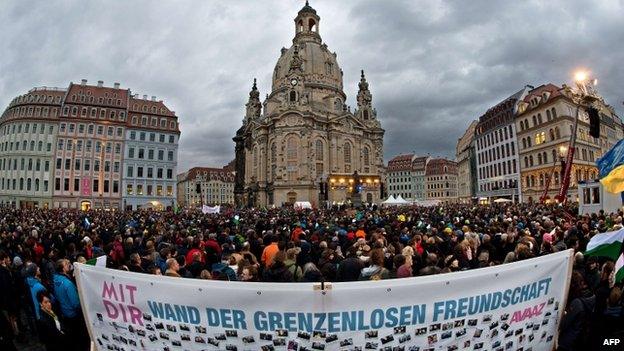
A banner reads "Wall of friendship without borders" at the Dresden anti-Pegida protest
In her New Year address Chancellor Merkel urged citizens to shun Pegida: "Do not follow people who organise these rallies, for their hearts are cold and often full of prejudice, and even hate."
Politicians and celebrities signed a petition in Bild, Germany's biggest-selling daily, to protest against Pegida. They included ex-Chancellor Helmut Schmidt and retired footballer Oliver Bierhoff.
The petition said "no" to xenophobia and "yes" to diversity and tolerance.
On 5 January the anti-Pegida demonstrations were massive - crowds thronged the streets of Cologne, Stuttgart and Berlin.
There were dramatic gestures of support for the marchers: the lights of Cologne Cathedral were switched off, as were the lights at the Volkswagen plant in Dresden.
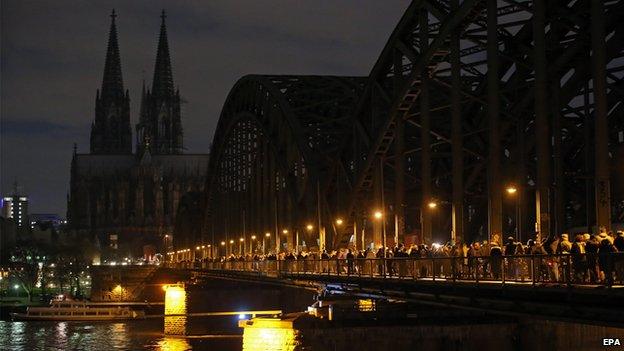
Cologne, 5 Jan 2015: The cathedral's lights were switched off, to say no to racism

Why is Islam an issue in Germany now?
German politicians have long been among the most vocal in Europe in support of tolerance and diversity.
That spirit of openness was partly a reaction against the evils of Nazism.
But in the 21st Century jihadist violence and urban deprivation have provided fertile ground for anti-immigration groups.
Even before Pegida's emergence, the wearing of Muslim headscarves in schools had already become a political issue. Many German states have banned teachers from wearing headscarves.
A recent Bertelsmann Foundation survey, external suggested that 57% of non-Muslim Germans consider Islam a threat.
Last year Germany received more than 180,000 asylum claims - compared with 127,000 in 2013. Germany accommodates more asylum seekers than any other European country. In areas with large immigrant communities there is often more pressure on housing and social services.
Germany's ethnic Turkish community is the largest immigrant group, numbering about three million, and most are Muslims. Many have lived in Germany for decades and many are well integrated.
But among the new asylum seekers are many Muslim refugees from war-torn Syria and Iraq. Muslim Chechens and Afghans have also sought refuge in Germany.
Pegida supporters believe that immigration and national identity are issues too long neglected by politicians - so they are trying to raise public awareness.
But there is anxiety now that, in the wake of the Charlie Hebdo atrocity, such marches may stir up Islamophobia.
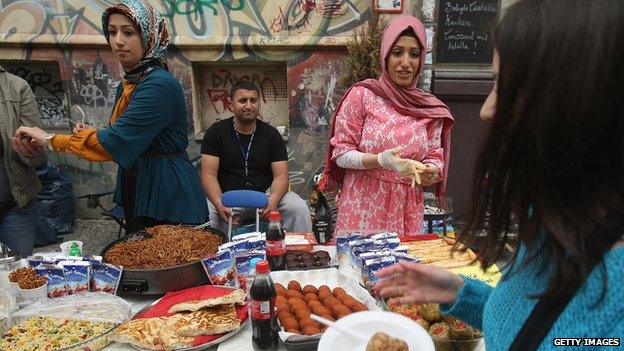
Berlin's Kreuzberg district has a large ethnic Turkish community
- Published12 January 2015
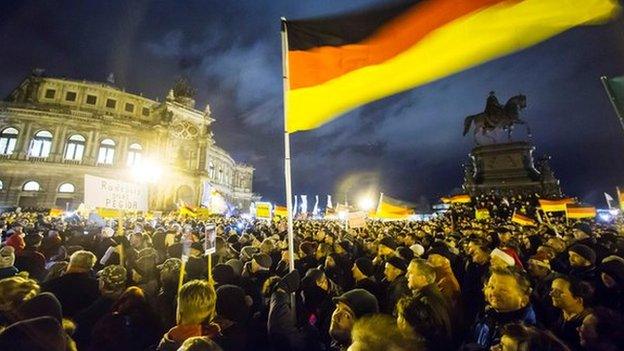
- Published6 January 2015
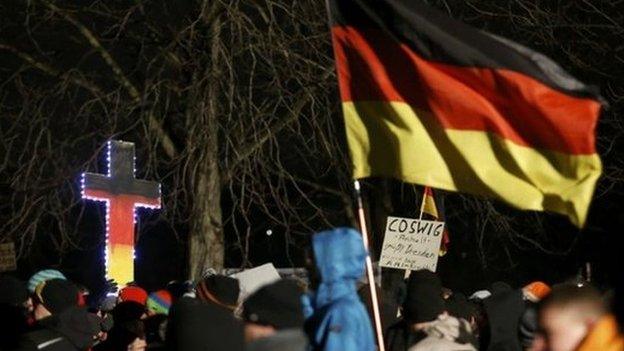
- Published9 December 2014
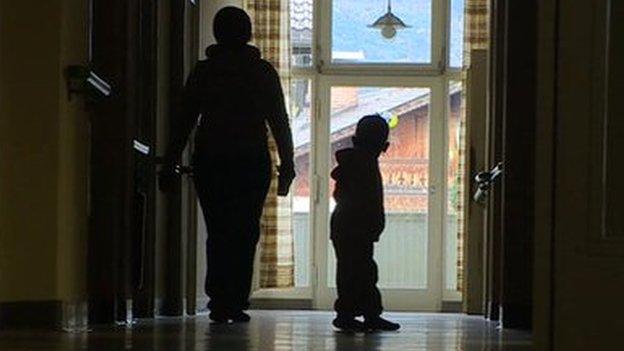
- Published3 March 2016
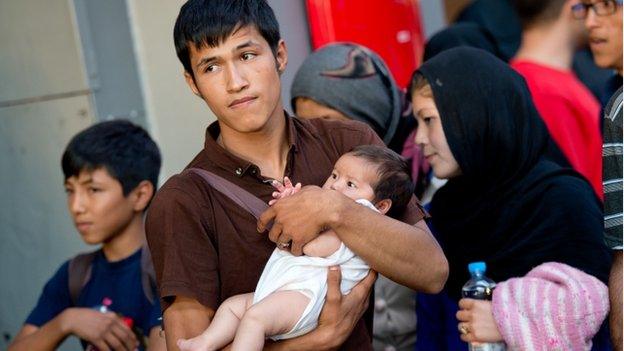
- Published11 January 2015
